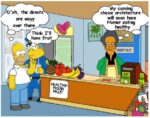
Driving behaviour change with awareness days
Here are some tips to go beyond awareness and drive behaviour change.

Identifying the levers to increase reusable cup usage
Are you looking for ways to reduce the barriers to reuse behaviours and decrease the use of single-use plastics? Learn about Refill campaigns that increase the alternative solutions to single-use plastics.

The permaculture-behaviour change connection
Permaculture (Permanent Agriculture) is inspired by the study of nature and indigenous tribes and is an approach to living and working with nature on the land, and in society and can be applied to all aspects of life.

Did these get your attention?
I do alot of behaviour change training around waste and this caught my attention. By making bins more colourful (and therefore salient) you can increase bin usage and reduce littering. Same bins, just a lick of vinyl!

Vegan cake-making lessons for behaviour change
Here are some behavioural insights from the conversations and my own experience as a vegan cook.

Tips for creating lasting habits
As it’s the start of a new year, I am looking at introducing new habits, so I thought I would use the principles that I share for pro-environmental behaviour.

Your actions are part of something bigger
Social proof and feedback loops show other people are acting and the impact of actions.

Changing the layout & sequence for behaviour change
By changing the defaults, the layout and the sequencing of items, foods and materials we can drive pro-environmental behaviour change without having to convince people about the impacts, the issues or needing to appeal to their values.

Christmas: the ultimate behaviour change campaign
I looked up research on behavioural drivers and Christmas. What I came away with was a huge swathe of insights that demonstrates how behavioural tactics were used to help Christmas and Christianity get adopted by the pagans and consequently the buttons it presses to maintain its traditions and customs year on year.

Engaging social housing residents with waste reduction
I have been doing lots of research on successful initiatives around engaging social housing residents with waste reduction.

Reframing a zero waste xmas campaign
When looking at a Zero Waste Christmas campaign from a behaviour change perspective, one of the two focus areas was around avoiding giving gifts that are unwanted and therefore wasted.

Who’s values are you appealing to?
I took a Human’s Values Test which pinpoints my values against Shwartz Theory of Basic Values. One of the key takeaways for me from doing any of these tests is the awareness of how I choose to communicate with people who have different values to me, especially around environmental behaviour change and action.

No disposable cup day
Disposables are just another mechanism to reinforce the ‘Always Busy, So much to do, No time to stop’ culture that is causing so many environmental challenges.

The use of gamification for walking campaigns
An example on how to use gamification for sustainability and encourage sustainable behaviour change.

The concept of scarcity and how it affects people’s responses to change and a sense of agency
Scarcity is a tool used a lot in marketing as they know it activates our primal instincts. Whilst it may seem that the scarcity of earth’s resources, finite time to make change, could be a driver for change. The climate change coaches suggest that the opposite is actually true.

Are you a choice architect?
You are the choice architect by the infrastructure choices you make available to people. People will generally choose the easy option (the first thing available) or the default.

Mental shortcuts for recycling
Our brains are wired for energy conservation and to create mental shortcuts, what behavioral scientists call heuristics. I know that recycling is confusing, I spend a lot of time talking with clients about recycling issues and trying to unravel what waste contractors do and don’t accept. As well as what the claims made on packaging actually mean.

Feedback loops
Feedback loops are so important, and something I include in all my behaviour change training. Our brains are wired for short-term benefits so getting a reminder in the now helps.



